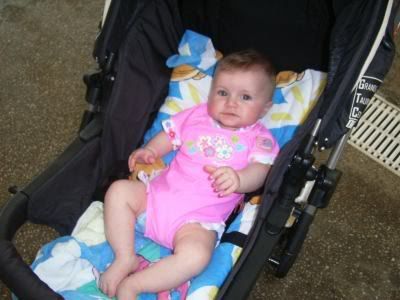After watching kids for so long, one of the many thousands of things that I couldn't realise, was the language development. Since my daughter came along, I was able to understand a great deal more, with the ways that their words form and are put together.
I can only comment on my own daughter, as I have been able to see things happen and develop every day. Getting past all the gurgling and the ooohs and arrrrs that children make, came her first words, well sort of words anyway. At the age of about 11 months, she began to make noises and gestures, all of which were sounds that she was trying so hard to turn into words, words that I believe were words, that to her were vital communication words.
Her first word was car, at the time we had no idea why it was car, but it was.
Why I say vital communication words, is because, the words that were to follow, was her way of saying what she wanted. I soon discovered that "car" was all about telling us that she wanted to go for a ride, or go for a ride to the shops.
The words that followed were Mum and Dad, more vital communication words that covered just about anything within the entire house that she wanted, food, toys, bottle etc.
There were a few words that she learnt along the way, such as cat, dog, chair etc, but these weren't vital words, as her urgency and her expressions were quite different.
Two more clear and distinct words soon followed, they were "more" and "again" (pronounced agen). All of these words, were very firmly encouraged in the hope that more words would follow. I think repetition was the key here. More words did follow, many more words.
Now at the age of two years, her vocabulary is rising rapidly, with the use of plurals as well.
I must say though that my daughter is by no means gifted or better than any other child, she is just like any other kid, my wife and I just happen to have the time to spend many many hours a day with her, not just education, but simple things like playing with her toy animals, or just building a house with her blocks (singing a made up tune as we go).
It's all education of course, but at different levels, from playing games to teaching her to count for instance.
All of which are done with some kind of fun involved.
It is very important to note, that by the time they are three or four, they have learnt a massive amount of words, of which only a handful of words are actually comprehended.
If this is so, why don't we pick it up ?
The simple answer is, (as it was for me), it appears to us that all the words children say, is a result of learning. When we think of learning for ourselves, we read a new word and comprehend it straight away, so we feel that when a child has learnt a new word the same goes for them. But unfortunately for the most part, a child has simply learnt a new word, without comprehending it. Comprehension of new words, comes at a later stage.
As for their "vital communication words", they can't possibly comprehend what they have said, they just know, that if they say a word (that they have learnt), it will give them their desired reaction from the parents and they get what they want. For instance, a young child asks for a bottle of milk, sure the child knows that he or she is hungry, and all they care about is getting something for it. The word bottle has only one meaning, and that is to feed me, they don't care about what a bottle is, just what's in it.
Many more posts about language to come in the near future.







